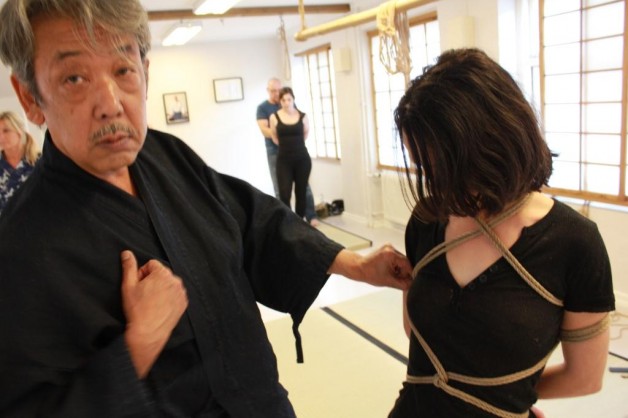Ironically, after getting chastised for translating ‘takate-kote’ as ‘box-tie’ in a tutorial in an effort to reduce the use of Japanese jargon, which can be mistranslated, obfuscate the subject or make shibari seem elitist for beginners, I seem to have committed a gaff by using a Japanese word incorrectly. I mistakenly misused the word ‘deshi’, understanding it to mean, possibly like many of you, no more than ‘student’, when referring to Nawa-Kun taking lessons with Kazami Ranki.
The dictionary gives a range of definitions from ‘pupil’, the sense I intended, to ‘teacher’s apprentice or helper, which I assume is how I was (mis-)understood. After a little further research, I came upon this article (extract below) which I believe clarifies the true import of the word ‘deshi’. It appears a far closer relationship than mere student, more akin to an apprentice or even disciple. I can the how such a major distinction would cause embarrassment to one as humble and sensitive to the Japanese culture as Nawa-Kun obviously is. Unlike us here, his humility exceeds his rope skills as he was most dismissive of his obvious ability during our email exchanges. I most sincerely apologise if I unintentionally caused any loss of face. The word ‘deshi’ was never mentioned by him, as he says “I am just a student”, and my use was merely for a variation that I perceived to be freely interchangeable with ‘pupil’ or ‘student’. Clearly, I was wrong. Lynn Reafsnyder says:
“Most of us have used the word deshi, often without any real understanding of just what the term means. Many of us hearing the word think of the usual, poor translation of “student,” but the word really means something much more. In Japanese, the term for student is gakusei (1) and the term for disciple is deshi (2). There is a difference.
Let’s take a look at the kanji for deshi. The word consists of two kanji, TEI, DAI, DE (3), which means “younger brother,” and SHI, SU, ko (4), which means “child.” In Kanji & Kana the meaning of deshi is “pupil, apprentice or disciple.”
But let’s dig a little deeper, into Nelson’s this time. Here DE (or Dai) includes such things as “younger brother, brotherly affection and faithful service to those older.” SHI in Nelson’s has the meanings of “viscount, master, child, male, fruit or seed.” In Nelson’s, the word deshi (teishi) is defined as “pupil, disciple, adherent, follower, apprentice, teishi: young person, teacher’s student-helper.”
Hmm, now we have some interesting concepts to work with.
Perhaps being a deshi is a little more involved than just attending class and being a “good” student. As we saw above, there is the phrase “teacher’s student-helper.” Could this simply mean being the senior student in the dôjô? Or does it mean you’re on the way to being a teacher? What a thought…”
Hopefully, very few people with the sufficient linguistic skills to appreciate the significance of my mistranslation will actually see the original post which has now been removed. It is exactly this sort of social faux pas that I hoped to avoid with the help of bi-lingual collaborators. My spectacular own goal just goes to show how much we need the help of people like Nawa-Kun to avoid causing accidental offence and to gain greater understanding. I hope this will be dismissed as a stupid, but well-intentioned, gaijin falling foul of linguistic nuance, like a foreigner asking for a large sheet being understood to be saying “I need a big shit (beeg sheet)”. I am reminded of this Two Ronnies video from the less than PC 80’s.

